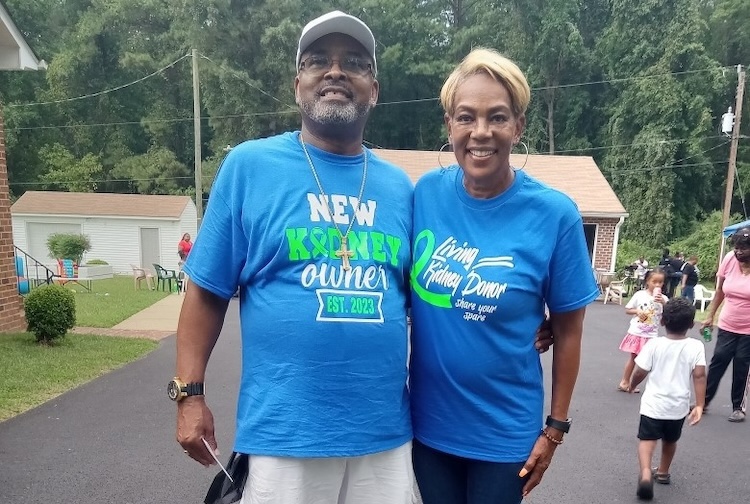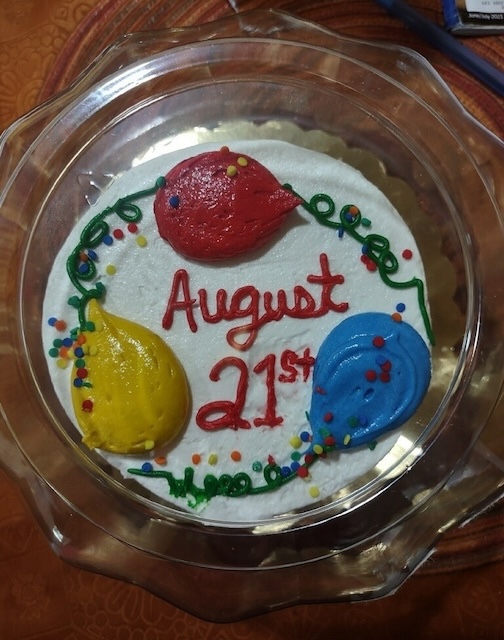'My angel' donates kidney to lifelong friend
Friends from church, bonded together through a lifesaving kidney transplant, call attention to the need for more living organ donors in Black and underrepresented communities.
August 19, 2024 Childhood friends Mark Cash and Toney Rosado are bonded together because of the life-saving gift of organ donation. (Sherilyn Smail, Enterprise Marketing and Communications)
Childhood friends Mark Cash and Toney Rosado are bonded together because of the life-saving gift of organ donation. (Sherilyn Smail, Enterprise Marketing and Communications)
By Jeff Kelley
One day in July 2023, Mark Cash arrived home to find his wife, Valerie, who presented him with a cake on the kitchen table. Written in frosting was the date: “August 21.”
The date meant nothing to Mark. His birthday is in January.
But Valerie told him that August 21 was the day he'd receive a life-saving kidney from a childhood friend, a fellow parishioner at their church in Ashland, Virginia. The living donor, Toney Rosado, had received a phone call earlier in the day from VCU Health informing her she was a match for Mark, and gave her the planned surgery date.
Mark simply hadn't gotten his own call yet, so the news - and dessert - came as a welcome surprise.
“Toney is my angel,” Mark said.
The need for kidneys and donors in the Black community
Of the 113,000 people on the national organ waiting list, more than 96,000 need a kidney. August is National Minority Donor Awareness Month, helping address concerns and raise awareness of the importance of organ donation among communities of color, which make up 60% of the list. Black people account for about one-third of the waiting list.
When it comes to kidneys, Black people are three times as likely as white people to experience kidney failure. Dialysis to remove waste from the kidneys is an option, but the process severely lowers life expectancy. A kidney transplant ensures the fullest life possible.
For Mark, it was both diabetes and high blood pressure that led to his kidney failure. It's a combination prevalent in Black communities that contribute to kidney disease and lower life expectancy even more than many cancers, says Dhiren Kumar, M.D., medical director of living donor kidney transplant program at VCU Health Hume-Lee Transplant Center.
Compounding the problem of high demand for kidneys is a low supply of them.
Black transplant candidates in particular wait longer for kidneys, in part because African Americans have lower rates of living donors coming forward compared to other populations. While race and ethnicity are not considered during the organ donation process, Donate Life America notes that there is evidence of improved long-term survival if the donor and recipient are closely matched by their shared genetic background. Compatible blood types and tissue markers are more likely to be found among members of the same race or ethnicity. Black communities often experience lower access to medical care and insurance, leading to delayed diagnosis and faster progression of their conditions.
It is living donation, as opposed to using kidneys from deceased patients, that is critical to expanding the donor pool and providing better long-term outcomes. “So, when I do see Black patients, I explain the importance of living donation to them,” Kumar said.

Mark Cash and Toney Rosado want others to know that it's worth becoming a living organ donor and continue to share their story with their local community. (Contributed photo)
Still, there is “a built in, and rightfully so sometimes, mistrust of the health care system” in communities of color, Kumar noted.
Such mistrust is a prevalent issue in America, which has a long history of mistreating Black patients, and you don't need to look far to find an example: Hume-Lee Transplant Center is credited with the first heart transplant on the East Coast in 1968 and among the first in the nation. While the patient, Bruce Tucker, contributed to an important medical advancement, the procedure was done without his or his family's knowledge or consent. VCU and VCU Health have since approved a resolution that acknowledges and apologizes for the treatment of Tucker. The university and health system are working with the family to find more ways to honor and recognize Tucker's legacy.
“People in the Black community still believe in the myths” surrounding transplantation and have mistrust of the medical system, Toney says.
Among the myths and concerns of patients:
- There's the one that doctors won't save your life if you list yourself as an organ donor on your driver's license. That statement is not true.
- There's a lack of understanding about the health outcomes of a living donor. There's no impact on life expectancy for the donor and the recipient of a kidney from a living donor can last up to 25 years.
- There are concerns about the financial burden for a donor. Hume-Lee team members assure patients: The medical bill for a living donor is typically $0. Recipients are likely covered by insurance, Medicare, or Medicaid.
“I tell people they need to rethink those myths about becoming an organ donor [whether on a license or as a living donor], but also the importance of keeping themselves healthy,” Toney said. “You need to do what you can do, not only to help your own family members, but to help other people. Because we want everybody in our community to have the same fair share of being able to get an organ and be a living donor.”
David Bruno, M.D., director of Hume-Lee Transplant Center, is very passionate about Hume-Lee's mission of saying 'yes,' to more patients and creating equitable access to care for all.
“We, as physicians, need to counter these myths by being upfront and transparent with the recipient and donor to reassure them that it is safe to move forward,” Bruno said. “It's crucial that we regain trust to ensure every patient receives the life-saving treatment they need and deserve.”
'A force of nature'
By mid-2022, Mark was in kidney failure and went on dialysis. At church, he shared in private with friend Toney his need for a kidney, and that he needed to find a donor.
“I thought about it maybe a day or two, and let him know I'd be interested in giving him my kidney,” Toney said.
That decision set off a series of tests, both physical and psychological, including questions on whether she was being compensated by Mark or someone else to donate her organ (she was not).
"The whole process was thorough," Toney recalled. "The transplant team at VCU Health answered all my questions and calmed any fears I had.”
Kumar called Toney “a force of nature.”
“She walked into our office saying, 'I'm not going to take 'No' for an answer,” he recalled. “What stands out the most for me was her motivation to communicate with us. She was proactive about getting this done, which is great because it helps us keep things moving forward and got Mark and her the best care as fast as possible.”
During her workup, the VCU Health team found a large and potentially cancerous cyst on her ovary. Before a transplant could go forward, the cyst had to be removed and screened.
“It was like a blessing for her to help me because she found out she had a condition that she wouldn't have known she had,” Mark said.
The cyst was benign. With the good news in hand, the transplant day was scheduled for August 21.

A small cake with a big meaning. Valerie Cash, Mark Cash's wife, surprised him with a cake with the date of his kidney transplant written in frosting. (Contributed photo)
A reason to celebrate: 'Cake Day' arrives
Toney recalls prep beginning at 5:30 a.m., fascinated by the otherworldly nature of the operating suite. In that room was the robotic surgical system used to remove her kidney. VCU Health is increasingly utilizing robotic-assisted surgical techniques for living donors, leading to less scarring, a faster recovery and reduced pain. Beyond four small punctures on her abdomen where four robotic arms are inserted, Toney walked away with a small scar on her lower abdomen, like a Cesarean section.
After surgery, Toney spent two days in the hospital. Within the first day, she was showering on her own and in only minimal pain.
“I rested, but I was up and walking during the daytime, and in about two weeks I resumed 90% of my normal activities,” she said. “In four weeks, I was back to cutting grass.”
Mark, 63, still lives with diabetes, but his blood pressure is under control. He's lost nearly 40 pounds since the transplant. He's changed his diet, opting for baked or grilled foods, though he's medically cleared to snag some fried food from time to time. He also gave up the occasional drink or cigar.
“I'm not going to do anything that's going to work against me, because I've got a second lease on life,” he said. “It's like if I ask to borrow your car…then I go and tear the car up? That doesn't make much sense.”
Kumar calls Toney “an ambassador” for living donation. She and Mark have become advocates for living donation and healthy living both at Providence Baptist Church in Ashland and within their local community.
“I'm paying it forward to anyone who needs help,” Mark said.
VCU Health is doing its part, too.
"Building trust is crucial," Kumar said. VCU Health does a significant amount of local outreach, visiting community centers in Black neighborhoods, like churches, to inform people and answer questions about becoming a living donor, cancer screenings, as well as other health conditions.
"It's about engaging with the community and providing clear, trustworthy information," he said. "Our approach is to be upfront and transparent with patients about the safety and necessity of living donor transplants. These measures are essential in encouraging more people to consider donation, especially within minority communities.”
For Toney, the journey has been humbling.
"I didn't do it for the recognition," she said. "Knowing that Mark and his family can now live without the shadow of kidney failure is thanks enough."
Learn how you can become a living organ donor
Find a provider at Hume-Lee Transplant Center
Inspired by Mark and Toney's story? Read more about our patients and providers




